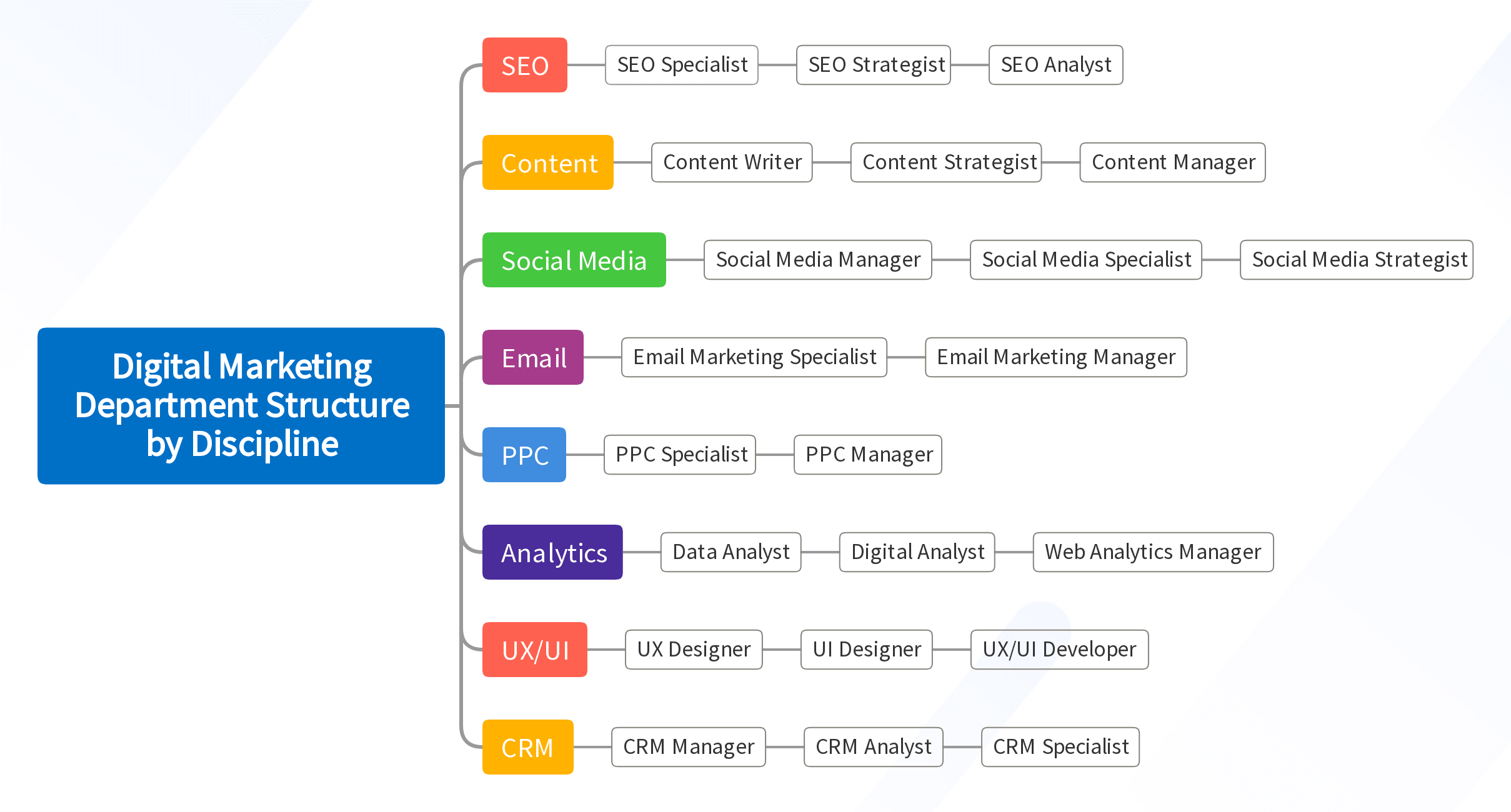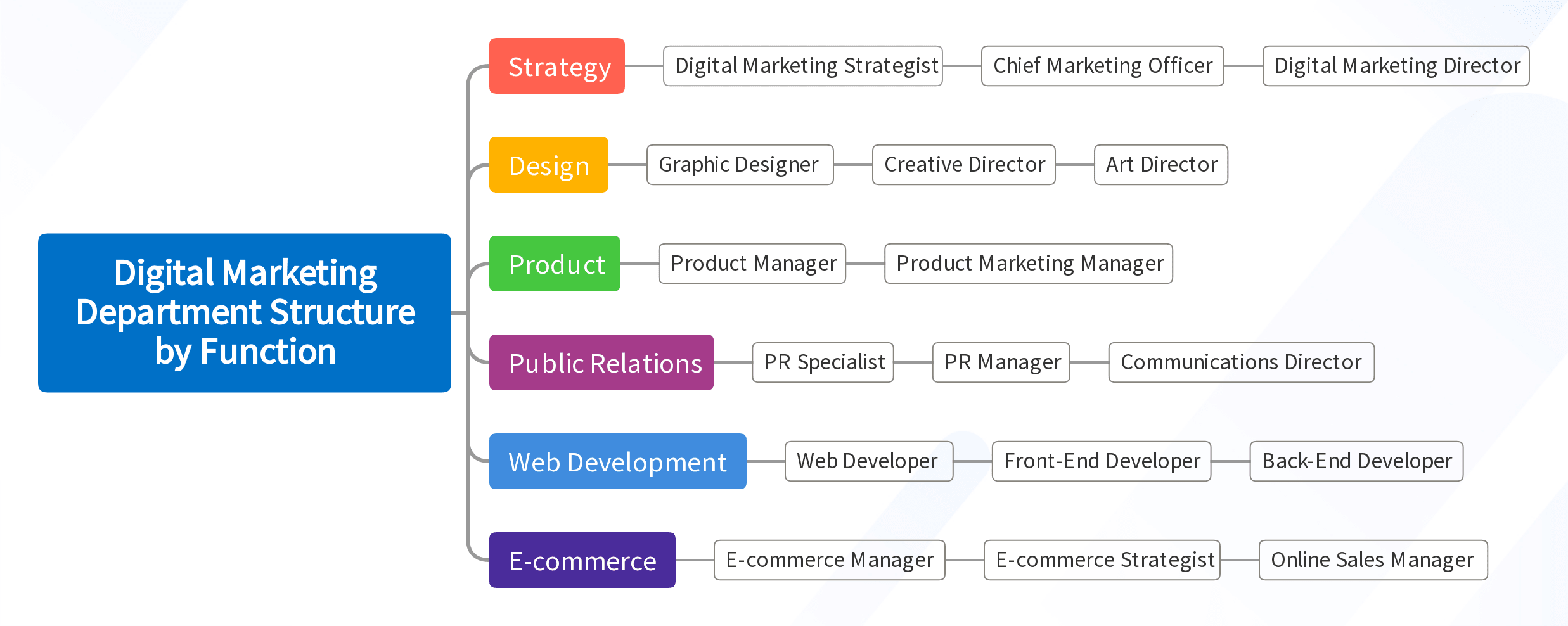

Digital marketing teams play a critical role in our dynamic business world. They bridge the gap between brands and their online audiences.
Structuring such a team requires strategic insight. Each role should align with the company's broader goals, ensuring effective online presence. I've learned this firsthand while growing my own marketing agency, GrantSpark.
But first, let's talk about the Digital Marketing department structures you have to choose from.
Best for Growth Marketers
Best for Paid Ads & CMO's
Table of Contents
Structuring Digital Marketing Department
There are two main types of department structures based on company size and resources.
- Digital Marketing department structure by discipline
- Org Type: Traditional corporate departments
- Best For: Midsize/Enterprise companies
- Digital Marketing department structure by function
- Org Type: Employees are grouped by activities and objectives
- Best For: Small to Medium Sized Business (SMB)
Let’s go in-depth to each one of them.
1. Digital Marketing Department Structure by Discipline


Discipline-based structure involves building teams centered around various marketing disciplines. For example, SEO, Content, Market Research, and Product Strategy could each form separate teams within a department.
| Discipline | Key Skills | Potential Roles |
|---|---|---|
| SEO | Keyword Research, On-page and Off-page Optimization, Analytics, Understanding of Ranking Algorithms | SEO Specialist, SEO Strategist, SEO Analyst |
| Content | Content Creation, Copywriting, SEO Writing, Editing, Content Strategy | Content Writer, Content Strategist, Content Manager |
| Social Media | Content Planning, Community Management, Social Analytics, Paid Social Ads | Social Media Manager, Social Media Specialist, Social Media Strategist |
| Email Design, Copywriting, Data Management, A/B Testing, Analytics | Email Marketing Specialist, Email Marketing Manager | |
| PPC | Keyword Bidding, Ad Creation, Conversion Optimization, A/B Testing | PPC Specialist, PPC Manager |
| Analytics | Data Analysis, Reporting, Statistical Knowledge, Google Analytics | Data Analyst, Digital Analyst, Web Analytics Manager |
| UX/UI | Prototyping, Wireframing, User Testing, Interaction Design | UX Designer, UI Designer, UX/UI Developer |
| CRM | Customer Retention, Data Analysis, Campaign Management, Segmentation | CRM Manager, CRM Analyst, CRM Specialist |
2. Digital Marketing Department Structure by Function


Another approach is structuring by function, where teams are formed based on the different functions they perform. For example, promotion, launches, and relationship management could all be separate teams.
| Function | Key Skills | Potential Roles |
|---|---|---|
| Strategy | Market Research, Competitive Analysis, Digital Marketing Strategy, ROI Optimization | Digital Marketing Strategist, Chief Marketing Officer, Digital Marketing Director |
| Design | Branding, Graphic Design, Software Proficiency (e.g. Photoshop, Illustrator), Creativity | Graphic Designer, Creative Director, Art Director |
| Product | Product Development, Project Management, User Experience, Market Analysis | Product Manager, Product Marketing Manager |
| Public Relations | Press Release Writing, Media Relations, Crisis Management, Brand Awareness | PR Specialist, PR Manager, Communications Director |
| Web Development | HTML/CSS, JavaScript, Responsive Design, Cross-Browser Compatibility | Web Developer, Front-End Developer, Back-End Developer |
| E-commerce | Platform Management (e.g., Shopify, Magento), Sales Strategy, Conversion Rate Optimization | E-commerce Manager, E-commerce Strategist, Online Sales Manager |
Digital Marketing Team Size versus Business Scale
To achieve successful marketing outcomes, you need to align the team size with your business's scale – a strategic approach that helps optimize resources and drive targeted growth.
| Business Scale | Ideal Department Size | Explanation |
|---|---|---|
| Start-up | 1-2 | Limited budget, focus on essential digital marketing strategies. |
| Small-Medium Business | 3-5 | Greater budget allows for more diverse marketing initiatives. |
| Large Enterprise | 6+ | Extensive resources for full-scale, multi-channel marketing campaigns. |
Factors to Consider When Deciding On a Digital Marketing Department Structure
- Company Goals: Understand your company's objectives and marketing goals. This will guide the formation of your digital marketing team and ensure that all activities align with these goals.
- Current Skill Set: Evaluate the skills and expertise that are currently available within the organization. This will help identify gaps and determine the roles you need to fill.
- Budget Constraints: Financial resources play a significant role in structuring your team. Be aware of your budget limits and allocate funds wisely to various roles and activities.
- Business Scale: The size and scale of your business will impact the structure of your team. Smaller businesses might require a lean team, while larger ones may need a more diversified team.
- Industry Trends: Stay updated with the latest trends in digital marketing. This can influence your strategies and the skill sets you require in your team.
Explore other marketing departments:
- Account-Based Marketing Team Structure
- Marketing Agency Team Structure
- Public Relations Team Structure
So, there you have it, a detailed overview of a Digital Marketing team structure. From the essence of the team and key roles, to structuring and optimizing; every aspect tailored to achieve success on your business blueprint.




















